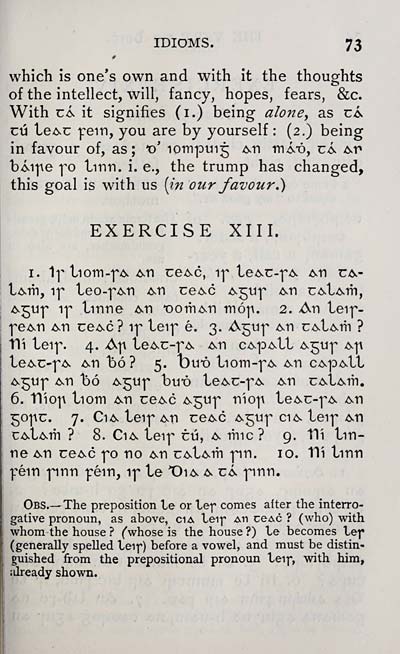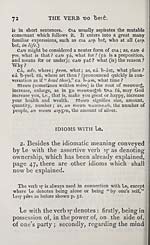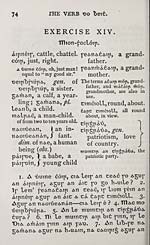Download files
Complete book:
Individual page:
Thumbnail gallery: Grid view | List view

idioms. 73
which is one's own and with it the thoughts
of the intellect, will, fancy, hopes, fears, &c.
With ca it signifies (i.) being alone, as ua
cú leAU pern, you are by yourself: (2.) being
in favour of, as; x>' lompuig An rnÁ-ó, cÁ Ar»
bÁipe po bnti. i. e., the trump has changed,
this goal is with us (in our favour.)
EXERCISE XIII.
1. 1]' tiorn-pA An ceAÓ, ip teAC-pA An ca-
Iaíti, ip teo-pAn An ceAC A^up An uAlArh,
^up ip tmne An "oorriAn mop. 2. An teip-
peAn An ceAC? ip teip é. 3. Ajgup An caIatti ?
Hi teip. 4. Ap teAC-pA An cApAlt &5up Ap
teAU-pA An bó? 5. \)wó born-pA An CApAlt
A$up An bó A$up bu*ó teAC-pA An caIa™.
6. flíop tiom An ceAc A^up níop LeAC-pA An
^opu. 7. Cia tei-p An ceAc ^up cia teip ah
caLa™ ? 8. Cia teip cu, a true? 9. Hi l/m-
ne ^n ceAc po no An caIa™ pn. 10. tli bnn
pém pinn pern, ip te ThA a cá pnn.
Obs.— The preposition te or Le-p comes after the interro-
gative pronoun, as above, cia Leir An ceAC ? (who) with
whom the house ? ('whose is the house ?) be becomes tef
(generally spelled beif) before a vowel, and must be distin-
guished from the prepositional pronoun teir, with him,
;ilready shown.
which is one's own and with it the thoughts
of the intellect, will, fancy, hopes, fears, &c.
With ca it signifies (i.) being alone, as ua
cú leAU pern, you are by yourself: (2.) being
in favour of, as; x>' lompuig An rnÁ-ó, cÁ Ar»
bÁipe po bnti. i. e., the trump has changed,
this goal is with us (in our favour.)
EXERCISE XIII.
1. 1]' tiorn-pA An ceAÓ, ip teAC-pA An ca-
Iaíti, ip teo-pAn An ceAC A^up An uAlArh,
^up ip tmne An "oorriAn mop. 2. An teip-
peAn An ceAC? ip teip é. 3. Ajgup An caIatti ?
Hi teip. 4. Ap teAC-pA An cApAlt &5up Ap
teAU-pA An bó? 5. \)wó born-pA An CApAlt
A$up An bó A$up bu*ó teAC-pA An caIa™.
6. flíop tiom An ceAc A^up níop LeAC-pA An
^opu. 7. Cia tei-p An ceAc ^up cia teip ah
caLa™ ? 8. Cia teip cu, a true? 9. Hi l/m-
ne ^n ceAc po no An caIa™ pn. 10. tli bnn
pém pinn pern, ip te ThA a cá pnn.
Obs.— The preposition te or Le-p comes after the interro-
gative pronoun, as above, cia Leir An ceAC ? (who) with
whom the house ? ('whose is the house ?) be becomes tef
(generally spelled beif) before a vowel, and must be distin-
guished from the prepositional pronoun teir, with him,
;ilready shown.
Set display mode to: Large image | Transcription
Images and transcriptions on this page, including medium image downloads, may be used under the Creative Commons Attribution 4.0 International Licence unless otherwise stated. ![]()
| Early Gaelic Book Collections > Blair Collection > Treas leabhar Gaedhilge > (79) |
|---|
| Permanent URL | https://digital.nls.uk/82322334 |
|---|
| Description | A selection of books from a collection of more than 500 titles, mostly on religious and literary topics. Also includes some material dealing with other Celtic languages and societies. Collection created towards the end of the 19th century by Lady Evelyn Stewart Murray. |
|---|
| Description | Selected items from five 'Special and Named Printed Collections'. Includes books in Gaelic and other Celtic languages, works about the Gaels, their languages, literature, culture and history. |
|---|

